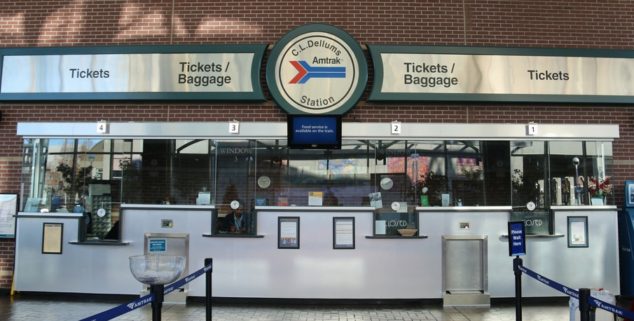News
Reporter’s Notebook: Rolling through flyover country
 The Amtrak station in Oakland. (Photo: Supannee_Hickman, via Shutterstock)
The Amtrak station in Oakland. (Photo: Supannee_Hickman, via Shutterstock)We Californians frequently make assumptions about the rest of the country, especially the part that lies east of the Sierra up to the shores of Washington, D. C. Not all of them are true, at least not always.
“You guys live in a little blue bubble out there on the coast,” says my son Patrick, an attorney in Washington whom we visited for a few days.
Leaving from Chicago, the California Zephyr travels through Illinois, Iowa, Nebraska, Colorado, Utah, Nevada and, finally, California — a total of 2,438 miles. It’s a combination of rolling green farmland and then spectacular scenery in the Rockies and the Sierra. Midwestern farms are huge, but they don’t seem to be as “industrialized” as those in California’s Central Valley.
Here’s a little of what we saw.
A resident of deep-blue California would be wise to practice HOOT (Hold Off On Trump) because his support is widespread among the mixture of Americans found on a cross-country railroad expedition.
It is not true, for instance, that Midwesterners believe a tostada is an Italian appliance into which you put slices of bread in the morning. Nor is it true that Duck a l’Orange, to a Midwesterner, is how you avoid Donald Trump.
You can order Huevos Rancheros in Chicago restaurants and watch people ignore their companions to zero in on their devices. You’d think you were in San Francisco.
But our recent trip across the country by rail does bring home some things — generally — about how we differ from the rest of these United States.
A resident of deep-blue California would be wise to practice HOOT (Hold Off On Trump) because his support is widespread among the mixture of Americans found on a cross-country railroad expedition. A Californian notices an abundance of American flags on private homes and businesses, compared with California. And there seems to be far fewer sports cars. Teslas are rare.
In the view of Flyover Country inhabitants — not all, certainly, but many — coastal elites are smug inhabitants of glittering cities.
As we rolled through the endless green fields of southern Illinois, a thoughtful and observant Fort Wayne, Indiana, financial executive, now retired, told me in an Amtrak dining car that most of the Midwesterners he knows — and he gets around a lot — do believe that there are indeed coastal elites who look down their noses at Midwesterners.
The executive, who asked that his name not be used, said that it wasn’t just a difference in political outlook, with the Midwest more conservative and Republican. It’s more than that, he said. It’s also about deep-rooted cultural and “values” issues.
In the view of Flyover Country inhabitants — not all, certainly, but many — coastal elites are smug inhabitants of glittering cities where odd, if not out-and-out immoral behavior is not only tolerated, but admired an encouraged.
“For instance, there’s a difference in the attitude toward same-sex marriage,” he said. “It’s certainly not unanimous, but in the Midwest, you’re more likely to encounter support for a baker who doesn’t want to bake a wedding cake for a same-sex couple.”
He spent his first 19 years in a village near Omaha and couldn’t wait to get out.
Yet at the same time, he pointed out, a proposed law that would have broadened the right of merchants to refuse service if they disapproved of the customer provoked a statewide recoil of indignation in Indiana, and was abandoned in the face of Hoosier outrage.
A retired Air Force C-130 loadmaster was contemptuous of his Midwestern background, however.
He spent his first 19 years in a village near Omaha and couldn’t wait to get out. He said the village was insular, didn’t much care about the wider world, and there was a great deal of intermarriage among the residents, reinforcing their insularity. Their lives, he thought, were unutterably dull and there was mystification over his youthful desire to see the world. (He joined the military, spent 10 years in Germany with the Japanese wife he had met in Okinawa, and is now living happily ever after.)
Traveling across the broad and untroubled countryside of the Midwest, it’s easy to see how those far-off residents of the East and West Coasts can be regarded as exotic and not altogether harmless tribes who are scornful of family values, and threaten them because of their dominance of the media.
But the retired financial executive takes the long view of all our differences.
“You know, we do a lot of bumping around in the dark, looking for the light switch,” he said. “But in the end we emerge stronger because of it.”
Want to see more stories like this? Sign up for The Roundup, the free daily newsletter about California politics from the editors of Capitol Weekly. Stay up to date on the news you need to know.
Sign up below, then look for a confirmation email in your inbox.

Leave a Reply